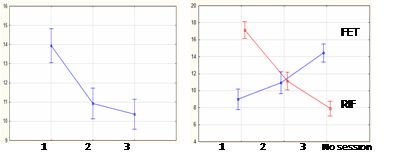Abstract
This study analyzed the possible role of the retrieval-induced forgetting (RIF) approaches in explaining inhibition process changes on different stages of the ontogenesis, i.e. childhood, and both early and later adulthood. The study sample included 81 children aged 5-8 years, 111 university students (17-22 years), and 126 seniors (55-72 years). A new version of the RIF paradigm to study individual voluntary-intentional strategies to memorization and retrieval of visual items was used. Stimulus presentation and recording of responses was controlled via specially created program software (
Keywords: Retrieval-induced forgetting (RIF)different stages of ontogenesismemoryinterferencechildrenadults
Introduction
The efficiency of remembering and retrieving information are one of the most important in learning. The researchers suggest the complex dynamics of memory as the retrieval modifies memory with both positive and negative consequences. Among different memory processes, the retrieval-induced forgetting (RIF) induces special interest as the consequence of an inhibitory mechanism to retrieval target items excluding non-target information (Murayama et al., 2014).The studies of the organization of inhibitory functions in the early and late stages of ontogenesis are actual, since the formation of executive control is seen as the basis for successful teaching of children (Ribner et al., 2017, Sanchez-Perez et al., 2017) and as the predictor of their high intelligence and social status in the future (Moffitt, 2011). On the other hand, the decrease in inhibitory control during aging is the basis for weakening the effectiveness of cognitive functions in the elderly (Hasher, Zacks & Rahhal, 1999). Theories of cognitive development have in general focused on memory decrements in aging and active memory using in child learning. However, individually widespread differences in these effects indicate that they must also account for domains of performance mechanisms that are used both in childhood and in old age. It is important to enhancing learning in students and reducing memory deficits in clinical populations.
Problem Statement
The results from numerous previous studies have shown that retrieval practice can enhance learning and long-term memory by reducing proactive interference from previously studied information (Karpicke & Blunt, 2011). Different theoretical hypothesis is known to explain this effect: (i) based on enhanced segregation between target and nontarget lists during retrieval or (ii) encoding-related improvement of the subsequently studied target material. So, interference processes during both encoding and retrieval of information are involved in final efficiency of memory. This forward effect of testing (FET) is a relatively late-maturing phenomenon and is still inefficient in the early elementary school years (Aslan & Bäuml, 2015; Kliegl, Wallner, & Bäuml, 2018).
Also these children are characterized only gradual development of executive control of information selection together with formation of neural systems in the frontal cortex (Nikolaeva, 2015; Nikolaeva, & Vergunov, 2017; Garon, Bryson, & Smith, 2008).
As for the elderly, it is worth noting a number of studies which have shown that different forms of memory progressively decline with age (e.g., Razumnikova, 2015; Salthouse, & Soubelet, 2014). The two mechanisms proposed to explain age-related differences in memory difficulties, i.e., the inhibitory deficit and the transmission deficit hypothesis. Although age factor has mainly been looked at in relation to memory processes, noncongruent results were found while both RIF and forward effect of testing (Pastötter. & Bäuml, 2014; Soares, Polack, & Miller, 2016).
Retrieval practice can induce RIF as result of the context shift. The RIF studies have typically employed some variants of a retrieval-practice paradigm using a series of category-exemplar pairs of words or pictures drawn from a number of different semantic categories. Difference in recall performance between non-practiced items from practiced categories and non-practiced items from non-practiced categories is referred to as RIF (Murayama, Miyatsu, Buchli, & Storm, 2014; Reppa et al., 2017; Yang, Potts, & Shanks, 2018).
Despite interest in the age effects on memory, only a limited number of studies have investigated relationships between the choice-supportive remembering and RIF.
Research Questions
The question is provided remains unknown: how information selectivity is implemented after demanding it’s forgets? Other important question is age-related specificity in an organization of interference processing during subjective determined strategies of information memorizing.
Purpose of the Study
This study analyzed the possible role of the RIF approaches in explaining inhibition process changes on different stages of the ontogenesis, i.e. childhood, and both early and later adulthood.
Research Methods
The study sample included 81 children aged 5-8 years (GR_0), 111 university students (17-22 years) (GR_1), and 126 seniors (55-72 years) (GR_2). All participants reported normal or corrected-to-normal vision and reported being able to perceive color normally.
We used a new version of the RIF paradigm to study individual voluntary-intentional strategies to memorization and retrieval of visual items. Stimulus presentation and recording of responses was controlled via specially created program software (Razumnikova & Savinykh, 2016) on a Windows-based PC. The colored objects from different natural categories (plants or animals, i.e., flowers, insects, et al., Fig.1) were presented in random on a color background (‘clearing in the wood’, Fig.1).

There were three session of presentation the items for their memorization and retrieval. During each session participants were asked to mark by a mouse the items which were not early indicate during this session. Choices of first and new items have been done intentionally. At the first presentation, from a set of thirty stimuli the any three stimuli appear on the screen, after selecting one of them the second stimulus is added in random order. After non-correct choice of stimulus, i.e. which was already marked in this session, a new series is begun.
Memory data from the three experimental sessions and summarized score of marked stimuli were analyzed. RIF index was calculated as difference in the memory measure between final and initial sessions.
Findings
The ANOVA revealed a main effect of AGE, F(2,312)=13.35, p<0.00001. The memory variables in three groups of participants are presented in the Table
In the course of further analysis, different dynamics of stimuli reproduction was found: some subjects demonstrated proactive interference (GR_RIF), others were characterized, on the contrary, by better reproduction of stimuli during testing (GR_FET). The analysis of age-specific features of memory taking into account this classification (GR_INTERF) revealed the general effect (F(2,610)=135.41, p<0.000001) (Figure
Note: RIF-retrieval induced forgetting, FET - forward effect of testing; * - p<0.0005 between GR_2 vs. GR_0 or GR_1, # -p<0.03 between FET and RIF.

Patterns of results are consistent with an inhibitory account, but little is known about the mechanisms underlying this memory phenomenon. Our results just demonstrated it but did not cover.
Conclusion
Purpose of the study was to analyzed the possible role of the RIF approaches in explaining inhibition process in childhood, and both early and later adulthood.
The worse memory shown elder people. The highest scores of memory were found out in the initial session of the testing. The variance analysis for RIF did not revealed statistical differences between people of different ages. Participants of different ages had different dynamics of stimuli reproduction. They demonstrated both RIF and FET strategies. Significant differences in memory with higher values are characteristic of those children and elderly people who have a predominant RIF. For students the opposite effect was found out.
Acknowledgments
Supported by the Russian Foundation for Basic Research, project No 17-06-00166.
References
- Aslan, A. & Bäuml, K.-H. T. (2015). Testing enhances subsequent learning in older but not in younger elementary school children. Dev. Sci., 19, 992–998.
- Garon, N., Bryson, S. E., & Smith, I. M. (2008). Executive function in preschoolers: A review using an integrative framework. Psychol. Bull., 134, 31-60.
- Hasher, L., Zacks, R. T., & Rahhal, T.A. (1999). Timing, instructions, and inhibitory control: Some missing factors in the age and memory debate. Gerontology, 45, 355-357.
- Karpicke, J.D., & Blunt, J.R. (2011). Retrieval practice produces more learning than elaborative studying with concept mapping. Science, 331, 772.
- Kliegl, O., Wallner, L., Bäuml, K.T. (2018). Selective directed forgetting in children. J Exp Child Psychol., 167, 433-440.
- Moffitt, T.E., Arseneault, L., Belsky, D., Dickson, N., Hancox, R.J., et al. (2011). A gradient of childhood self-control predicts health, wealth, and public safety. Proc. Natl. Acad. Sci. USA, 108, 2693–2698.
- Murayama, K., Miyatsu, T., Buchli, D., & Storm, B. C. (2014). Forgetting as a consequence of retrieval: a meta-analytic review of retrieval-induced forgetting. Psychological Bulletin, 140(5), 1383-1409.
- Nikolaeva, E.I. (2015). Alexander Luria: creator in the perspective of time. In: Anticipation: Learning from the Past. The Russian/Soviet Contributions to the Science of Anticipation (pp. 457-468). Berlin: Springer.
- Nikolaeva, E.I., Vergunov, E.G. (2017). What is "executive functions" and its development in ontogenesis. Theoretical and experimental psychology, 10(2), 62-81. (In Russian)
- Pastötter, B., Bäuml, K.H. (2014). Retrieval practice enhances new learning: the forward effect of testing. Front Psychol., 5 (286).
- Razumnikova, O.M. (2015). Patterns of brain aging and activation of its compensatory resources. Uspechi pfysiologischeskich nauk, 46(2), 3-16.
- Razumnikova, O.M. & Savinykh, M.A. (2016) Author Сertificate No 2016617675. A software package for determining the characteristics of the systems of visual-spatial memory. (In Russian).
- Reppa, I., Williams, K.E., Worth, E.R., Grevill, W.J., Saunders, J. (2017). Memorable objects are more susceptible to forgetting: Evidence for the inhibitory account of retrieval-induced forgetting. Acta Psychologica, 181, 51–61.
- Ribner, A.D., Willoughby, M.T., Blair, C.B. (2017). Executive function buffers the association between early math and later academic skills. Front Psychol., 8 (869).
- Salthouse, T.A., Soubelet, A. (2014). Heterogeneous ability profiles may be a unique indicator of impending cognitive decline. Neuropsychology, 28 (5), 812-818.
- Sánchez-Pérez, N, Castillo, A, López-López, J.A., et al. (2017). Computer-based training in math and working memory improves cognitive skills and academic achievement in primary school children: Behavioral results. Frontiers in Psychology, 8 (2327).
- Soares, J.S., Polack, C.W., & Miller, R.R. (2016). Retrieval-induced vs. context-induced forgetting: Does retrieval-induced forgetting depend on context shifts? J Exp Psychol Learn Mem Cogn. 42(3), 366–378.
- Yang, C., Potts, R. & Shanks, D.R. (2018). Enhancing learning and retrieval of new information: a review of the forward testing effect. Science of Learning, 3 (8).
Copyright information

This work is licensed under a Creative Commons Attribution-NonCommercial-NoDerivatives 4.0 International License.
About this article
Publication Date
23 November 2018
Article Doi
eBook ISBN
978-1-80296-048-8
Publisher
Future Academy
Volume
49
Print ISBN (optional)
-
Edition Number
1st Edition
Pages
1-840
Subjects
Educational psychology, child psychology, developmental psychology, cognitive psychology
Cite this article as:
Razumnikova, O., & Nikoloeva, E. (2018). Age-Related Effects In Retrieval-Induced Forgetting. In S. Malykh, & E. Nikulchev (Eds.), Psychology and Education - ICPE 2018, vol 49. European Proceedings of Social and Behavioural Sciences (pp. 576-581). Future Academy. https://doi.org/10.15405/epsbs.2018.11.02.64

